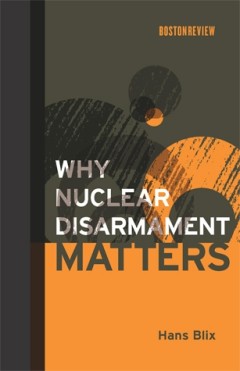Filter by

Why nuclear disarmament matters /
From the former UN head weapons inspector in Iraq, a plea for a renewed global disarmament movement.
- Edition
- -
- ISBN/ISSN
- -
- Collation
- 1 online resource (95 pages).
- Series Title
- -
- Call Number
- -

Tritium on Ice: The Dangerous New Alliance of Nuclear Weapons and Nuclear Power
The dangers of a United States government plan to abandon its fifty-year policy of keeping civilian and military uses of nuclear technology separate.In December 1998, Energy Secretary Bill Richardson announced that the U.S. planned to begin producing tritium for its nuclear weapons in commercial nuclear power plants. This decision overturned a fifty-year policy of keeping civilian and military …
- Edition
- -
- ISBN/ISSN
- 9780262268233
- Collation
- 1 online resource (x, 234 pages) :illustrations
- Series Title
- -
- Call Number
- -

Our own worst enemy? :institutional interests and the proliferation of nuclea…
An examination of the effectiveness of knowledge nonproliferation programs implemented by the United States after the fall of the Soviet Union.OCLC-licensed vendor bibliographic record.
- Edition
- -
- ISBN/ISSN
- 9780262295970
- Collation
- 1 online resource (xiii, 358 pages) :maps.
- Series Title
- -
- Call Number
- -

Unmaking the Bomb: A Fissile Material Approach to Nuclear Disarmament and Non…
The global stockpile, continued production and use of plutonium and highly enriched uranium facilitates proliferation, increases the risk of nuclear terrorism and is an obstacle to achieving irreversible nuclear disarmament. The book explains how these materials are used, describes the histories of fissile material production for weapons, provides an overview of the current global stockpile of …
- Edition
- -
- ISBN/ISSN
- 9780262319188
- Collation
- 1 online resource (x, 277 pages) :illustrations, map
- Series Title
- -
- Call Number
- -

Sharing knowledge shaping Europe U.S technological collaboration and nonproli…
How America used its technological leadership in the 1950s and the 1960s to foster European collaboration and curb nuclear proliferation, with varying degrees of success.OCLC-licensed vendor bibliographic record.
- Edition
- -
- ISBN/ISSN
- 9780262336413
- Collation
- 1 online resource.
- Series Title
- -
- Call Number
- -

Transforming nuclear safeguards culturethe IAEA, Iraq, and the future of non-…
The role of organizational culture in international efforts to stop the spread of nuclear weapons.In Transforming Nuclear Safeguards Culture, Trevor Findlay investigates the role that organizational culture may play in preventing the spread of nuclear weapons, examining particularly how it affects the nuclear safeguards system of the International Atomic Energy Agency (IAEA), the paramount glob…
- Edition
- -
- ISBN/ISSN
- 9780262369763
- Collation
- 1 online resource.
- Series Title
- -
- Call Number
- -

Why nuclear disarmament matters
From the former UN head weapons inspector in Iraq, a plea for a renewed global disarmament movement.OCLC-licensed vendor bibliographic record.
- Edition
- -
- ISBN/ISSN
- 9780262268738
- Collation
- 1 online resource (95 pages).
- Series Title
- -
- Call Number
- -
 Computer Science, Information & General Works
Computer Science, Information & General Works  Philosophy & Psychology
Philosophy & Psychology  Religion
Religion  Social Sciences
Social Sciences  Language
Language  Pure Science
Pure Science  Applied Sciences
Applied Sciences  Art & Recreation
Art & Recreation  Literature
Literature  History & Geography
History & Geography